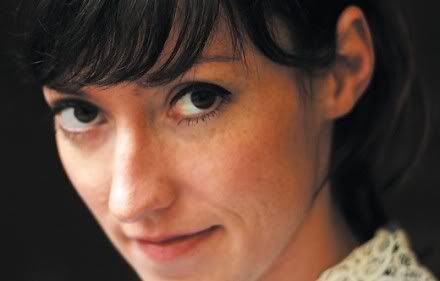: charlotte roche
Zonas húmedas
Charlotte Roche
Anagrama, 2009, 208pp.
Había leído ríos de tinta sobre cierta escritora-rockstar alemana de treinta años que estaba causando sensación y polémica con su primer libro. Platicando antier con Jorge Herralde, le conté del entusiasmo que me había causado aquella novela post-feminista (entusiasmo que, para ser honesto, al conocer a la autora fue potenciado). Le hablé más o menos extasiado de la trama, que es, por usar un eufemismo amable: inconfundible. "La adolescente que se excita mientras limpia los escusados públicos con el chocho". Algo así como Salinger-meets-Jelinek. A lo que él, de inmediato, compartiendo a medias mi furor, respondió algo como: "Ah, claro... Vamos a publicar su novela pronto". Granta, en su tiempo, había descrito el discurso de Charlotte Roche (1978, High Wycombe, UK) como uno que "evoca la voz de Salinger en El guardián en el centeno, la perversión de J.G. Ballard en Crash y el ideario feminista de Germaine Greer en La mujer eunuco". Para las hordas de fans de lectores en español que, como yo, se le sumarán ahora, aquí hay un adelanto y acá está la página de Zonas Húmedas de Anagrama.
Philip Oltermann
There’s a theory about German culture that goes something like this: Germans are very good at all sorts of things – making films, making cars, making beer – but in order to be truly popular with a people that like to consider themselves intellectuals, you have to write a book.
Thirty-year-old Charlotte Roche, born in High Wycombe but raised in Germany, has been a recognizable face in her adopted home country since she started working as a presenter on Viva, the German equivalent of MTV, in the mid-1990s. She went on to write and present programmes and late-night talk shows for Arte and ZDF, and won the highly respected Grimme Prize for television in 2004. But only now that she has written her first book are people ready to take her seriously.
Feuchtgebiete, which translates roughly as ‘wetlands’ or ‘moist patches’, was published by Cologne’s Dumont Verlag earlier this year. It is narrated by eighteen-year-old Helen Memel, an outspoken teenager whose childlike stubbornness is paired with a premature sense of sexual confidence. After a failed attempt to shave her intimate parts, Helen ends up in the Department of Internal Medicine at the Maria Hilf Hospital. She doesn’t leave the ward for the rest of the novel. Surrounded by surgical instruments and humming X-ray machines, she reflects in ever more uncomfortable detail on the eccentric wonders of the female body. It’s an explicit novel, often shockingly so, but also a surprisingly accomplished literary work, which evokes the voice of J.D. Salinger’s The Catcher in the Rye, the perversion of J.G. Ballard’s Crash and the feminist agenda of Germaine Greer’s The Female Eunuch.
Feuchtgebiete hasn’t been out of Germany’s newspapers since publication, selling half a million copies. In March, it became Amazon’s worldwide bestseller, the first German book to do so since Amazon made its sales figures public in 2004. As English-language publishers are engaged in a bidding war for Feuchtgebiete, Granta contributing editor Philip Oltermann caught up with Roche for an interview.
PO: You had a very successful career in television – why did you decide to write this book?
CR: First of all, the themes that appear in my book – the body, illness, hospitals, masturbation – are themes that I have always been fascinated by. I dare say they’re my hobbyhorses. Whenever someone at a dinner party says that they’ve had an operation, I’ll be the first person to shout: ‘Come on, let me see it then!’ So it’s really the case that these issues are close to my heart – it’s not like I decided to write a shocking book first, and then just wrote down the most disgusting things I could imagine. I enjoy thinking about these sort of things in detail.
I’m convinced that in contemporary society a lot of women have a very messed-up attitude to their own bodies. We’re obsessed with cleanliness, with getting rid of our natural excretions and our body hair. So I wanted to write about the ugly parts of the human body. The smelly bits. The juices of the female body. Smegma. In order to tell that story, I created a heroine that has a totally creative attitude towards her body – someone who has never even heard that women are supposedly smelly between their legs. A real free spirit.
From the way you talk about Feuchtgebiete, it sounds more like a manifesto than a novel. Is it fair to say that there are two books competing against each other in one?
Yes, I think that’s right. Originally I wanted to write a non-fiction book. At the heart of it was always a general feeling: I was really jealous of the fact that men have this whole range of different names for their sexual organs – beautifully detailing what state of arousal they’re in – while us women still don’t really have a language for our lust. For example, I think a lot of women still don’t masturbate, simply because they don’t know how to talk about it.
I wanted to write in a creative way about the female body: exploring it, but also making it strange. I used to shut my eyes when I wrote, trying to shut out all that worn-out vocabulary we have about our physicality and come up with new words for each body part. ‘Cauliflower’ for Helen’s haemorrhoids, ‘pearl trunk’ for her clitoris, and so on. Someone had to do it!
I wanted to point out how a lot of the emancipatory principles from the ’60s and ’70s have not yet arrived properly. In that respect, this book really is a manifesto, and I do think it has a serious message.
How did the manifesto turn into a novel?
I started to suspect that I was writing a very arrogant book – something very ‘top-down’ rather than ‘bottom-up’. ‘Charlotte Roche tells Germany’s women how to appreciate their sexual organs’. That wasn’t right. I know that I have my own limits, my own taboos too, when it comes to talking about sex, and I realized that I could only really go full throttle if I voiced these ideas through a fictional character.

